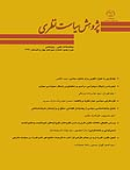بررسی تطبیقی امکانات نظری کاربردی شدن نظریههای تنوع فرهنگی (لیبرالیسم، پسالیبرالیسم، نسبیگرایی و باهمادگرایی)
محورهای موضوعی : پژوهش سیاست نظریسارا نجف پور 1 , سید جواد امام جمعهزاده 2
1 - استادیار گروه علوم سیاسی، دانشگاه شهید چمران اهواز
2 - دانشگاه اصفهان
کلید واژه: تنوع فرهنگی باهمادگرایی پسالیبرالیسم لیبرالیسم نسبیگرایی,
چکیده مقاله :
برخلاف پیشبینیها و علی رغم پیشرفت روزافزون فناوریهای ارتباطی، جوامع بشری امروز نه تنها به سمت یکدست شدن کامل پیش نمیروند، بلکه هویتها، سبکهای مختلف زندگی و همچنین اقلیتهای قومی و مذهبی که تا چند دهۀ گذشته بیمناکِ از دست دادن هویت خود بودند با استفاده از امکانات دنیای امروز، دوباره سر برافراشته و میکوشند وجوه تمایز خود با دیگران را مطرح کنند و به این ترتیب، حق حفظ سنتها و عمل مطابق با آن را برای خود محفوظ نگاه دارند. در این عرصه چگونگی تعامل و کنش متقابل و عادلانۀ هویتها، فرهنگها و اقلیتها و اکثریتها با هم مسئلهای اسـت که نظریه های مختلفی در مورد آن ارائه شده است که اغلب برآمده از متن فرهنگ لیبرال بوده و ابعاد هنجاری آنها متوجه این جامعه و فرهنگ است. مقالۀ پیش رو، در پی فهم این نکته است که کدام یک از این نظریهها، امکانات نظری بیشتری برای کاربردی شدن در جوامع چند فرهنگی دارند؟ در بررسی تطبیقی و انتقادی، مهمترین رویکردها و نظریههای تنوع فرهنگی از جمله رویکردهای لیبرال، پسالیبرال، نسبیگرایانه و باهمادگرایانه به نظر میرسد که رویکرد باهمادگرایانه در جوامعی که تنوع فرهنگی دارند، میتواند امکانات نظری بیشتری برای کاربردی شدن داشته باشد. پژوهش پیش رو برای پاسخ به پرسش خود از روش توصیفی و تحلیلی و ابزار کتابخانهاي بهره میبرد.
Against predictions and despite the progressive developments in communication technologies, not only contemporary human societies are not becoming completely homogeneous, but also the identities, different life styles and also ethical and religious minorities which were up to some decades ago in danger of extinction and losing their identities forever, they are raising again using today facilities and technologies and attempt to express their modes of distinction for others and hence, they can preserve their right to protect their traditions and act based on them for themselves. In this arena, the quality of interactions and mutual and just relations between identities, cultures, minorities and majorities with each other is an issue for which different theories are provided, most of which are taken from the liberal culture and their normative dimensions is related to society and culture. The current article attempts to understand this issue that which of these theories have more theoretical possibilities to become operational in multi-cultural societies? In this comparative and critical review of the most significant approaches and theories of cultural variety like liberal, post-liberal, relativism, and Communitarianism, it seems that Communitarianism approach may have more theoretical possibilities to become operational in multi-cultural societies. The current research applied the descriptive and analytic method and library resources to answer its question.


